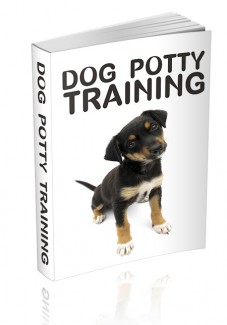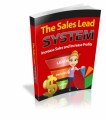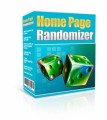
 License Type: Master Resell Rights
License Type: Master Resell Rights  File Size: 1,917 KB
File Size: 1,917 KB File Type: ZIP
File Type: ZIP
 SKU: 51557
SKU: 51557  Shipping: Online Download
Shipping: Online Download
Ebook Sample Content Preview:
CHAPTER FOUR Eliminating Accidents
Puppies need to be housetrained to realize that it’s not fine to pee and poop just anywhere. Potty training is a straightforward process, but one that must be executed positively (with no punishment that frightens the puppy) and consistently, following two main rules:
Avoid indoor accidents through confinement and close monitoring, and
Take the puppy outside on a regular schedule and reward him for eliminating where you want him to do his business.
House soiling may happen in any part in your home but sometimes pet parents will observe that their puppy soils more in selected places, like rarely used rooms or on a specific type of surface. Very young pups (under 12 weeks old) don’t have full bladder control and might be unable to hold it very long. Older puppies that’ve had accidents mightn't have been house trained entirely.
Why Pups You Thousht Were Housetrained Misht Have Mishaps Too Young to Be Fully House Trained
Some pups, particularly those under 12 weeks of age, haven’t developed bladder or bowel control yet.
Incomplete Housetraining
A lot of puppies simply haven’t learned where to eliminate or they haven’t learned a means to tell their people when they have to go out. Some pups house soil only under certain conditions. For instance, a puppy may soil when he’s home alone for very long time periods, very first thing in the morning, at some point during the night, only when you’re not watching or only in occasionally used rooms. Other pups may pee or poop whenever they feel the necessity to go.
Breakdown in Housetraining
At times pups who seem to be house trained at some point regress and start off soiling in the house again.
Some Other Reasons Your Puppy Misht House Soil Urine Marking
If your pup is over three months of age and pees small amounts on vertical surfaces, he could be urine marking. Young dogs doing this behavior often elevate their hind legs when peeing.
Separation Anxiety
If your pup only soils when he’s left alone at home, even for short time frames, he may have separation anxiety. If this is the case, you may observe that he appears anxious or upset right before you leave him by himself.
Submissive/Excitement Urination
Your pup may have a submissive/excitement urination predicament if he only urinates during greetings, play, and physical contact. If this is the case, you may observe your pup displaying submissive postures during interactions. He may flinch or cower, roll over on his belly, tuck or lower his tail, duck his head, avert his eyes, flatten his ears or all of the above.
Medical Reasons for House Soiling
It’s usually a good idea to visit your puppy’s vet to exclude medical causes for house soiling. Some widespread medical reasons for inappropriate urination and defecation are:
Urinary Tract Infection (UTI)
Pups with UTI usually pee frequently and in small amounts. They may additionally lick their genital areas more than usual.
Intestinal Upset
If your pup was house trained but now defecates loose stools or diarrhea at home, he may have intestinal upset.
Change in Diet
If you’ve recently modified the quantity or kind of food you give your puppy, he may develop a house soiling issue. Often, following a diet change, a pup will defecate loose stools or diarrhea. He may need to poop more frequently or on a different schedule than before the diet change.
Methods to Housetrain Your Puyyy
Housetraining is achieved by rewarding your puppy for eliminating where you want him to go and by stopping him from peeing or pooping in inappropriate places. You need to keep crating and confinement to a minimum; however, some amount of limitation is generally essential for your pup to learn to “hold it.”
House Trainins Steps
Maintain your pup on a constant daily feeding schedule and take off food between meals.
Take the puppy outside on a regular timetable.
In between these outings, know where your dog is at all times. You have to watch for early signs that he needs to pee and/or poop so that you can anticipate and stop accidents from happening
If you can’t watch your puppy, he must be restricted to a crate or a small room with the door closed or blocked with a kiddy gate. Otherwise, you can tether him to you by a leash that doesn't give him much freedom around you. Progressively, over days or weeks, give your pup more freedom; you start with freedom a small area, like the kitchen, and little by little increasing it to larger areas, or multiple rooms, in your home.
Go along with your puppy outside and reward him whenever he eliminates outdoors with praise, treats, play or a walk.
If you catch your pup in the act of eliminating inside, clap sharply twice, sufficient to startle but not frighten him. When startled, the dog should stop in mid-stream. Promptly run with him outside, motivating him to come with you the whole way. Allow your pet to finish eliminating outside, and then reward him with happy praise and a small treat.
Additional Housetraining Tips
Clean mishaps with an enzymatic cleanser to reduce odors that might entice the pup back to the same spot.
Once your dog is housetrained in your home, he may still have accidents when you have visitors. That’s because young dogs have to generalize their learning to new surroundings. Just because they appear to know something in one spot doesn't mean that they’ll automatically understand that thing everywhere. You’ll need to monitor your pup carefully when you visit new places together and be sure to take him out often.
What NOT to Do
Don't rub your pup's nose in his waste.
Don't reprimand your pet for eliminating indoors. Rather, if you catch him in the act, make a noise to surprise him and stop him from peeing or pooping. Then immediately show your puppy where you want him to go by running with him outside, waiting until he finish his business, and then praising him.
Don't physically punish your pup for accidents. Understand that if your pup has accidents in the house, you neglected to properly supervise him.
Don't clean with ammonia-based products. Urine contains ammonia. Cleaning up with ammonia can attract your puppy back to the same spot to pee again.
- File Size:1,917 KB
- License: Master Resell Rights
- Tags:2014 Ebooks Master Resale Rights







